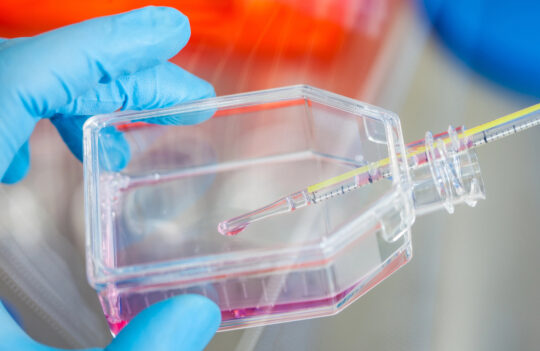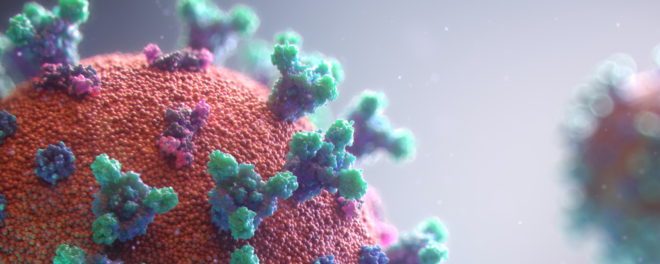 Antibody production
Antibody production
Polyclonal vs. Monoclonal antibodies: How to choose the best option for your project?
Antibodies—whether polyclonal or monoclonal—are widely used in the scientific community for their specificity and sensitivity.
- In therapeutics, antibodies offer a key advantage: their high specificity enables targeted treatments with fewer side effects than small molecules.
- In diagnostics, their affinity, specificity, and sensitivity make them invaluable for detecting trace amounts of analytes or performing precise quantification.
But before developing an antibody, a crucial decision must be made: should you choose a polyclonal or a monoclonal antibody?
This question often arises among our clients. In this article, we break down the key differences to help you make an informed choice.
Polyclonal antibodies: A rapidly produced, highly sensitive solution for detecting low abundance analytes
Definition: Polyclonal antibodies (pAbs) are a mixture of antibodies produced by immunizing one or more animals against a target antigen.
Advantages of polyclonal antibodies
- High sensitivity – Since they recognize multiple epitopes on the same antigen, polyclonal antibodies provide a strong signal, making them ideal for detecting low-abundance analytes.
- Cost-effective and fast to produce – Compared to monoclonal antibodies, pAbs are cheaper and quicker to generate.
Limitations of polyclonal antibodies
- Batch-to-batch variability – Because they are derived from animal immunization, polyclonal antibodies suffer from lot-to-lot variabilities, making them unsuitable for applications requiring standardized production (e.g., therapeutic antibody development or industrial diagnostic kits).
- Lower specificity – Their broad reactivity can lead to cross-reactivity and background noise, which makes them less reliable for quantification. However, this cross-reactivity can be advantageous when targeting multiple variants of an antigen.
Best use cases for polyclonal antibodies
- Ideal for detecting analytes at very low concentrations due to their strong signal.
- A cost-effective option for projects with budget constraints.
Why choose ProteoGenix polyclonal antibody production services?
- Highly competitive pricing – Starting around $390.
- Choice of 9 host species – Mouse, rat, rabbit, guinea pig, goat, sheep, chicken, alpaca, llama.
- RocketAbs protocol – Reduces immunization time by 50% (22–43 days depending on the antigen).
Monoclonal antibodies: Highly specific, standardizable, and ideal for large-scale applications
Definition: Monoclonal antibodies (mAbs) are derived from a single B cell clone and recognize a single epitope on an antigen.
Advantages of monoclonal antibodies
- Exceptional specificity – mAbs recognize a single epitope, reducing background noise and cross-reactivity.
- Standardized and scalable production – Since mAbs can be produced from a known sequence, they are consistent and reproducible, making them essential for therapeutic and diagnostic applications.
- Versatile engineering possibilities – Access to the antibody sequence enables optimization and engineering (e.g., affinity maturation, humanization, bispecific antibodies).
- Animal-free production possible – Technologies like phage display allow the development of monoclonal antibodies without animal use.
- Fully human antibodies – These can be generated using humanized mice or human antibody libraries via phage display.
Limitations of monoclonal antibodies
- Higher production complexity and cost – Monoclonal antibodies require a longer and more expensive development process.
- Lower sensitivity than polyclonals – Since monoclonal antibodies recognize only one epitope, they may produce a weaker signal. However, affinity maturation techniques can enhance their sensitivity.
- Epitope conformation sensitivity – If an antigen undergoes conformational changes, the mAb may lose its ability to bind.
Best use cases for monoclonal antibodies
- Ideal for quantification in diagnostic applications.
- Essential for therapeutic antibody development, where access to the sequence is required for engineering and optimization.
- The best choice for standardized, large-scale production.
Why choose ProteoGenix custom monoclonal antibody services?
- Three complementary monoclonal antibody discovery technologies, ensuring a tailored approach for each project.
- Rapid sequence identification – Obtain monoclonal antibody sequences in just one month via phage display.
- Unique antibody libraries – Including human, cancer patient, and autoimmune disease antibody libraries, maximizing the chances of discovering high-affinity antibodies for these pathologies.
Final takeaways: Polyclonal or monoclonal? It all depends on your application
Your antibody choice should align with your project’s needs:
- For therapeutic applications – There is no debate: monoclonal antibodies are essential because their sequence is required for production, optimization, and engineering (e.g., ADCs, bispecific antibodies).
- For diagnostics and research – The decision is more nuanced and depends on several factors:
| Criteria | Polyclonal antibodies | Monoclonal antibodies |
|---|---|---|
| Sensitivity | High – Recognizes multiple epitopes, ideal for detecting low-abundance analytes | Lower – Recognizes a single epitope, but can be improved via affinity maturation |
| Specificity | Lower – More prone to cross-reactivity and background noise | High – Minimal background noise and cross-reactivity |
| Reproducibility | Low – Batch-to-batch variability due to animal immunization | High – Standardized production from a defined sequence |
| Production speed | Fast – Quick to generate and cost-effective | Slow – More complex development process |
| Engineering potential | Limited | High – Can be optimized and engineered (e.g., affinity maturation, humanization) |
| Best suited for | Detection of low-abundance analytes, cost-sensitive projects | Quantification, therapeutic applications, large-scale diagnostics |
Of course, every project has its own unique constraints. For a more precise recommendation tailored to your needs, explore our custom antibody development services and reach out to our experts!




